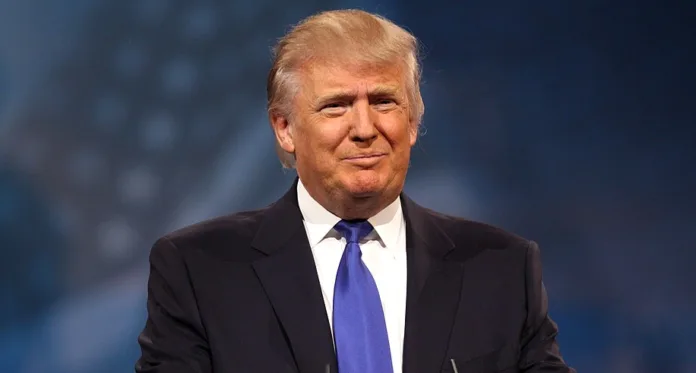Former president Donald Trump faces 34 counts of falsifying business records, insists trial is unfair and politically motivated
Moments after jurors began deliberating in Donald Trump’s hush money trial, the former president called the entire process “rigged” and suggested that even Mother Teresa wouldn’t be able to escape a conviction.
“These charges are rigged. The whole thing is rigged,” Trump told reporters in a hallway outside a 15th-floor courtroom in Manhattan on Wednesday.
“We have a trial like this where the judge is so conflicted he can’t breathe,” he continued. “He’s got to do his job. It’s a disgrace. Mother Teresa could not beat those charges. But we’ll see. We’ll see how we do. It’s a very disgraceful situation.”
Trump is charged with 34 counts of falsifying business records to cover up reimbursement payments to his attorney Michael Cohen. Cohen testified that his former boss directed him to make a $130,000 hush money payment to Stormy Daniels to prevent her from speaking publicly about having sex with Trump.
To find him guilty, jurors must determine that Trump not only had a hand in falsifying records but did so to commit or conceal another crime. Prosecutors argue that this crime was violating state law against conspiracy to influence an election by unlawful means, which includes campaign finance violations, falsification of other business records, and breaches of state and federal tax laws.
Prosecutors assert that the hush money scheme was part of a plan to corruptly influence the 2016 presidential election. Trump’s defence argues that the payments were personal matters unrelated to the election.
Ignoring reporters on his way into the courtroom in the morning, Trump spoke to a row of cameras outside the court doors after jurors left to begin their deliberations. He spent nearly five minutes attacking prosecutors, Justice Juan Merchan, President Joe Biden, the US-Mexico border, and Robert De Niro.
He falsely asserted that “every single legal scholar and expert said this is no case” and criticized the timing of the indictment, claiming it should not have been brought “in the middle of a presidential election.” A grand jury indicted Trump last March.
Trump also revived his conspiracy theory that the Biden administration directed the prosecution against him in New York. He complained about a gag order that he claimed prevented him from speaking about the case, although the trial gag order does not block him from discussing Biden, the judge, or Manhattan District Attorney Alvin Bragg. It only restricts him from attacking witnesses, jurors, court staff, other attorneys, and their families.
“In the meantime,” Trump concluded, “this trial is rigged.”
Analysis :
The hush money trial of Donald Trump brings multiple layers of political, legal, and social implications. Trump’s comparison of himself to Mother Teresa and his insistence on the trial being rigged underscore his strategy of portraying himself as a victim of political persecution. This narrative has been a consistent element of his public persona, rallying his base by framing legal challenges as attacks on their shared values.
Politically, Trump’s rhetoric resonates with his supporters, reinforcing their belief in a deep-state conspiracy against him. This strategy has proven effective in maintaining a loyal voter base, crucial for his political ambitions. However, it also polarizes the electorate further, deepening the divide between his supporters and opponents. The trial’s outcome could significantly impact his political future, potentially influencing his ability to run for office again.
From a sociological perspective, Trump’s actions and statements highlight the broader issue of public trust in the legal system. His claims of a rigged trial contribute to growing skepticism about the judiciary’s impartiality. This erosion of trust in legal institutions is particularly concerning in a democracy, where the rule of law is foundational. It raises questions about the long-term impact on public confidence in the justice system.
Economically, the trial has implications for Trump’s business ventures. A conviction could damage his brand, potentially leading to financial losses. Conversely, his portrayal as a persecuted figure might bolster support among his base, mitigating some negative economic impacts. His businesses, particularly in hospitality and real estate, could see fluctuations based on public perception influenced by the trial’s proceedings and outcome.
On a local level, the trial has put Manhattan in the national spotlight, with increased media presence and public interest. This attention affects the local community, from heightened security measures to the economic impact of the influx of media and supporters. Additionally, it places pressure on local legal institutions and officials, who must navigate the high-profile nature of the case while maintaining procedural integrity.
Gender and race also play a role in the public’s perception of the trial. The involvement of Stormy Daniels, a woman who alleged an affair with Trump, brings gender dynamics into the conversation. It highlights issues of power, consent, and the treatment of women in high-stakes legal and political battles. Moreover, the broader context of Trump’s history with marginalized communities and his controversial statements on race adds another layer of complexity to the trial’s societal implications.
In conclusion, Donald Trump’s hush money trial extends beyond the courtroom, impacting political discourse, public trust in legal systems, economic interests, local dynamics, and societal attitudes toward gender and race. The trial’s outcome will likely have far-reaching consequences, influencing not only Trump’s future but also broader societal and institutional perceptions.
